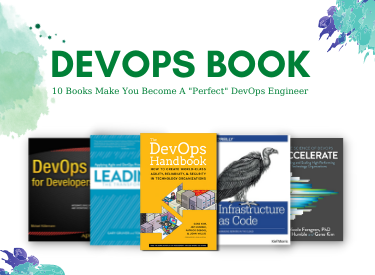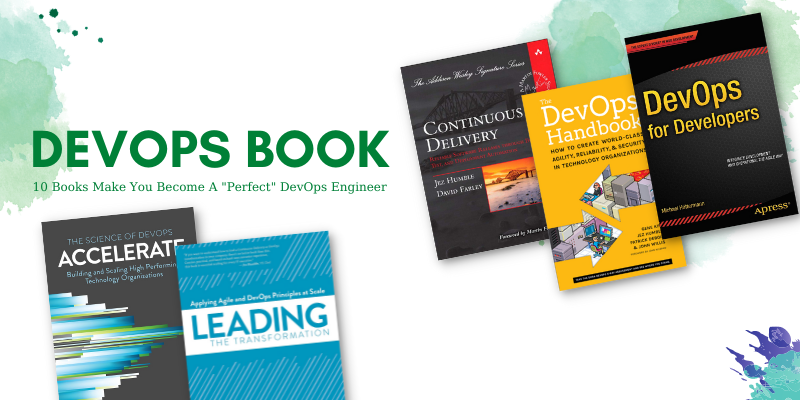10 Books Make You Become A “Perfect” DevOps Engineer


DevOps continues to advance to streamline software development and decrease the possibility of problems after deployment.
Although automated processes are typically considered the most important aspect of DevOps initiatives to decrease complexity and increase speed, the rapid evolution of this framework implies that by 2022 (and beyond), human-based expertise will be more crucial than ever before.
From enhancing current DevOps models to deploying innovative approaches like DevSecOps or using cloud-based solutions to manage processes on a larger massive scale, there’s an ever-growing demand for skilled DevOps experts to assist companies in making the most of this method.
Are you interested in DevOps but aren’t sure how to begin? Do you have some experience but would like to improve your understanding? Already an experienced professional and looking for fresh perspectives? We’ve prepared for you a list of 10 DevOps books that are worth reading this year.
Read more: Top 10 DevOps Trends to Watch 2022
The DevOps Handbook
Authors: Gene Kim, Jez Humble, Patrick Debois, John Allspaw and John Willis
Its DevOps Handbook: How to Create World-Class Agility, Reliability and Security in Technology Organizations. The book is regarded as the DevOps reference by a lot of readers. The authors discuss the necessity of adopting DevOps in any business and how it can help achieve a competitive advantage over the other. The book also discusses the main advantages of DevOps and practical applications of how to implement DevOps. There are many cases of companies that have succeeded in implementing it and the best way to implement DevOps in your own business.
The principal takeaways of these Devops books are:
- DevOps culture landscape
- Principles of flow and fast feedback
- Value stream mapping
- Continuous Integration and Continuous Delivery (CI/CD)
- DevOps KPI and metrics
The Phoenix Project
Authors: Gene Kim
The Phoenix Project book describes the idea of DevOps by using a fictional business and fictional workers. The plot revolves around Bill, a VP of Parts Unlimited, who has been tasked with fixing all the company’s issues. The company is fixed, and nothing works, including its payment method. Bill begins to find the root of the problem and develop solutions to them. The book reveals that these solutions are, in reality, DevOps practices. It’s an excellent method to grasp complicated DevOps topics enjoyably.
The principal takeaways of these DevOps books are
- DevOps fundamental principles are presented in story form
- It helps you understand the problems in an easy-to-understand manner
DevOps for Developers
The DevOps for Developers book describes the methods that allow agile software developers to bring software development from the design stage to the delivery phase. It uses the DevOps toolchain, which includes creating, coding packaging, testing release, configuring, and monitoring, to bring together software development and operation.
It provides its readers with the Fundamentals of DevOps to developers and introduces Building Blocks of DevOps. The book explains how to utilize measurements and metrics views, quality, and testing shared incentives and processing views to obtain quick feedback using a unifying and comprehensive method.
The Unicorn Project
Authors: Gene Kim
The Unicorn Project: A Novel about Developers, Digital Disruption, and Thriving in the Age of Databook is a sequel to Phoenix Project. It is a sequel to the Phoenix Project book and is written from a completely distinct point of view. The main protagonist is Maxine, the developer who works in Phoenix Project. Phoenix Project team. Maxine has an instructor in Erick who helps her learn the five principles of problem-solving in DevOps.
- Locality and simplicities
- Focus, flow, and joy
- Improved efficiency of the daily job
- Safety for the psychological
- Customer focus
The book does not require reading The Phoenix Project beforehand, and it is recommended to go through both DevOps books when you can.
Effective DevOps
Authors: Jennifer Davis and Ryn Daniels
Its Effective DevOps: Building a Culture of Collaboration, Affinity, and Tooling at Scale book will help you understand the core values of DevOps, from empathy to collaboration to assisting people in getting to know each other to create productive outcomes. It is primarily about achieving the DevOps mental state of mind and the best ways to implement these methods. It also talks a lot amount about gaining the support of the leadership.
The most important takeaways from the book include:
- reducing the risk and increasing the speed of delivery by minimizing mistakes in deployment
- Advanced and essential techniques to build pipelines for CI/CD
- Templates and scripts that automate building and deployment processes
Continuous Delivery
Authors: Jez Humble and David Farley
This Continuous Delivery: Reliable Software Releases through Build, Test, and Deployment Automation book provides you to implement practical advice and strategies for getting over obstacles and solving issues. It covers the complete CI/CD process in-depth and discusses how to move things quickly without needing to change your environment. There are many tips and tricks in the book that can assist you in creating more effective communication between testers, developers, and operations.
The most important takeaways from the book include:
- It is granular about the specifics of DevOps
- Offers agile methods and best practices to implement DevOps
- Virtualization, infrastructure management testing, and the deployment of DevOps
The DevOps Adoption Playbook
Authors: Sanjeev Sharma
This DevOps Adoption Playbook: A Guide to Adopting DevOps in a Multi-Speed book debunks some of the most commonly held DevOps misconceptions and demonstrates how it can work for large and small companies. Since there are no two teams, the book provides a detailed breakdown of the steps to implement DevOps to support different IT teams in software engineering and operations. Although the process can be different between small businesses and big enterprises, the real benefit that DevOps can’t be ignored. It’s a must-read, particularly for CTOs, IT managers, or anyone looking to take advantage of DevOps for enterprise-level use.
The main takeaways of these DevOps books are:
- Get the full benefit of DevOps IT organizations
- Implement DevOps in large and small-scale companies
- Get high-value innovation and optimization at a low cost and with minimal risk
Accelerate
Authors: Nicole Forsgren, Jez Humble and Gene Kim
The Accelerate: The Science of Lean Software and DevOps: Building and Scaling High Performing Technology Organizations book results from an extensive study of the capabilities that affect performance in developing and delivering software. The book thoroughly explains the four major factors that affect the overall performance of software – lead time, mean time to repair (MTTR), deployment frequency, and the percentage of change failure.
The most important takeaways from the book include:
- Continuous Delivery
- DevOps Architecture
- Lean Management and Monitoring
Infrastructure as Code: Managing Servers in the Cloud
Automation is an important element of a successful DevOps strategy. To make it possible for automation, organizations have to streamline ITOps tasks like infrastructure configurations and updates, provisioning, and maintenance. The increasing number of servers could cause unnecessary bottlenecks in the DevOps performance of an enterprise. That is why modern IT companies are urged to control their server’s resources using the code.
The book Infrastructure as Code: Managing Servers in the Cloud by Kief Morris discusses difficulties associated with the transition and provides how to use the various tools needed to handle the infrastructure in a code.
This book is for IT professionals seeking specific design patterns and best practices for delivering efficient DevOps transformation within a dynamic infrastructure.
Leading the Transformation: Applying Agile and DevOps Principles at Scale
Cutting-edge companies like Amazon, Google, and Netflix use Agile and DevOps to excellent effect, whereas others remain stuck with slow systems from the past. The leadership of the Transformation will provide executives with a clear plan for improving the development and delivery and also bringing the culture up to date. It’s concise, easy to digest, and addresses all major concerns.
Final Thought
Much like DevOps, learning about this development/operations approach is a continuous and never-ending process. Instead of a static model that provides a fixed method of building and deploying top-quality technology, DevOps is an iterative and dynamic environment continually developing and offering new ways for companies and teams to integrate key processes and provide better results.
No doubt learning from DevOps books written by experts will certainly help you excel in your career. Start your DevOps journey from these 10 great DevOps books. Good luck.
